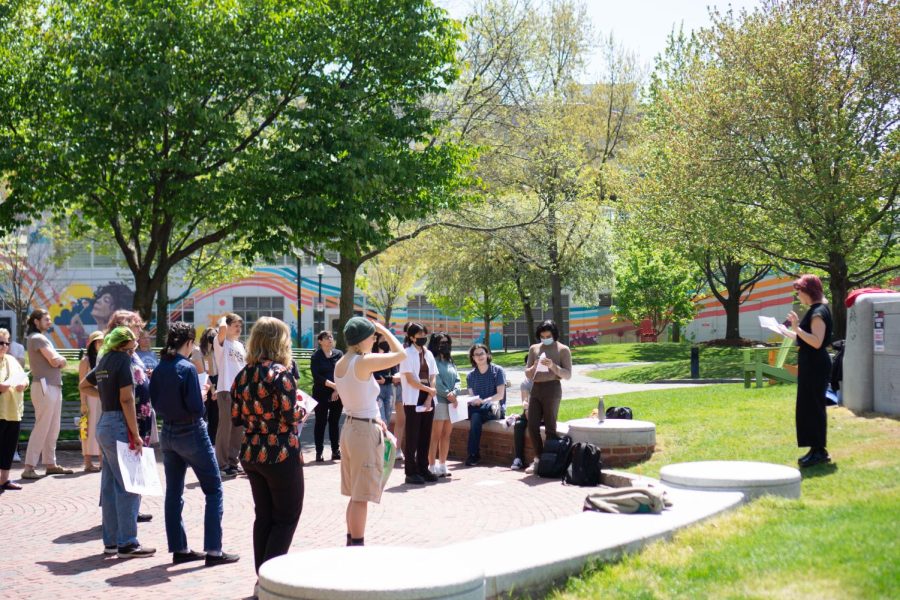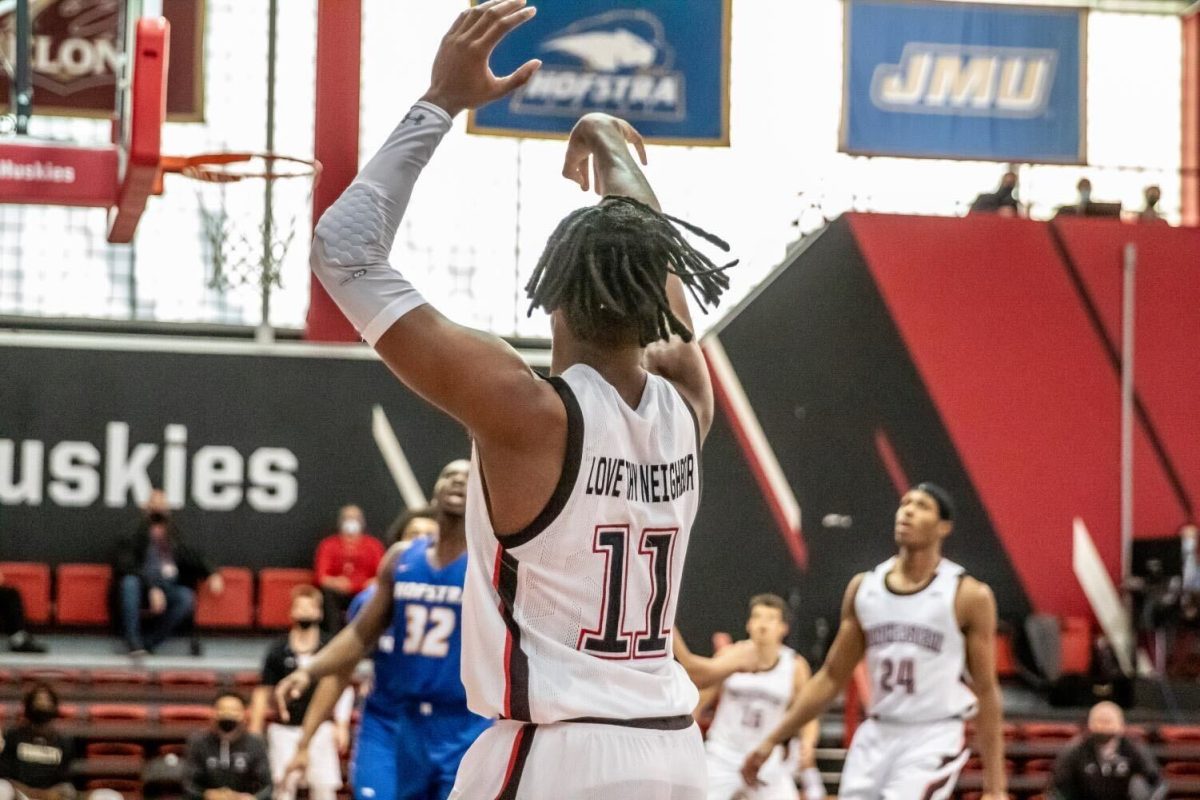Northeastern to install emergency contraception vending machine, students hope for more action
Students gathered in Centennial Common May 13 for a rally to protect abortion rights organized by NU SHARE. Photo courtesy of Emily Greenberg.
September 8, 2022
In a post-Roe world, universities in states like Massachusetts where Roe has been codified in state law may become a safe haven for students hailing from states that have criminalized abortions.
The Massachusetts Senate cemented the right to an abortion in state law in December 2020, and immediately following the United States Supreme Court’s decision to overturn Roe v. Wade in June, Gov. Charlie Baker signed an executive order to expand these existing rights.
The executive order protects reproductive health care providers from facing criminal charges in states that have criminalized abortions and prohibits extradition, which refers to moving someone who obtained an abortion in Massachusetts to a state where they would face criminal charges. As these measures are being signed into legislation, Massachusetts universities may help students from around the country access safe, legal abortions.
“I think [the anti-extradition bill] is great for people, especially from southern states like Texas, and especially for college students that are coming from southern states to Massachusetts,” said Julia Krupp, a second-year business administration and communication studies combined major who has lived in Texas her whole life.
Northeastern is working to give its students access to reproductive health care. The Northeastern University Student Health Plan, or NUSHP, provides coverage not just for medical abortions, but also for birth control, voluntary sterilization and family planning support.
“I didn’t know that Northeastern had any of these policies, and that’s really cool, but they should do a better job spreading the word,” Krupp said. “With the recent Roe v. Wade being overturned and abortion being criminalized [in some states], I think it’s fantastic that Northeastern’s offering all these under their student plan, because I couldn’t imagine any university in Texas being able to do that without the governor trying to sue them or something.”
However, with the NUSHP totalling almost $2,500 a year, some students choose to search for less expensive alternatives or remain on their parents’ healthcare plans. Students who are not on the NUSHP may not have access to these benefits, and those who have plans from states where abortion is criminalized may feel unsafe seeking reproductive health care through their insurance.
“It is inaccessible for a lot of people to be paying the amount of money that we pay for student health care services, and an emphasis on ‘student,’” said Ruchi Ramamurthy, a third-year student at the Northeastern University School of Law, or NUSL, and Tufts School of Medicine. “Healthcare in an ideal world should be free to everyone, but [students] are not even considered to be in the ‘real world’ yet.”
Ramamurthy, who is pursuing a Juris Doctor and Master of Public Health, is also co-chair of If/When/How: Lawyering for Reproductive Justice at NUSL, a student organization that provides education for law students to advocate for reproductive justice, as well as related intersectional issues like gender affirming care and menstrual justice.
“[Students] do have to encounter the real world in our daily lives, but we don’t have the support or the structure to be able to necessarily be successful in our own health because of the costs and the barriers to healthcare. I think that hopefully, as we grow, we can address more of those barriers and try to take on initiatives that address the importance of accessible and comprehensive health care with [Northeastern] administration.”
For students who are not on the NUSHP, Northeastern is beginning to make alternative resources available. Following a petition from the student organization NU Sexual Health Advocacy, Resources and Education, or NU SHARE, Northeastern is planning to install a vending machine on campus offering emergency contraception.
“Although supply chain issues are delaying the installment of emergency contraception vending machines on campus, we will have a temporary solution for the fall semester. We are making an existing vending machine available to dispense emergency contraception at a location that is accessible 24/7,” Northeastern spokesperson Shannon Nargi wrote in an email statement to The News Aug. 9.
According to Alexandra Nieto, a fourth-year biology major and the vice president of NU SHARE, the club has ordered a generic version of Plan B, Levonorgestrel, to stock the vending machine, making it more physically accessible to students and less expensive than a drugstore.
“NU SHARE is working closely with [the university] providing student input to make it a reality for students that would be applicable for us, such as a location that’s easy for students to get to, what our habits are, and when we would need access to it,” Nieto said. “We’re really inputting students’ ideas and what would actually be feasible for us.”
However, some advocacy groups on campus see this as just a first step in a long path towards reproductive justice for students.
“We were talking about different phases of the vending machine and having different products and not just emergency contraception in there, there’s potentially pregnancy tests coming in the future,” Nieto said. “I’m always hopeful that students will advocate for the needs of the students, and I hope that in the future beyond the vending machine, we work closely with the university to see some more tangible change.”
Julia Winett, a third-year law student at the Northeastern University School of Law pursuing her Juris Doctor degree and the other co-chair of Lawyering for Reproductive Justice at NUSL, wants to see a more supportive community for students seeking reproductive health care.
“At the very least, our community needs to be vocal about supporting each other throughout this process. We need to create an environment in which seeking reproductive care is not stigmatized and is accessible to all who want it. We are far from getting there,” she said.
Ramamurthy said she would also like to see Northeastern continue investing in initiatives to improve the accessibility of reproductive care for students.
“When students come onto campus, [Northeastern] showing them and telling them that they are supportive and they are willing to go the extra mile, whether that’s allocating a certain amount of funding for abortion care and for emergency contraceptives, for people who are coming out of state, it would be reaffirming that they are safer here and they won’t be criminalized,” she said.
She also emphasized the importance of informing students, especially those whose home states are criminalizing abortion, about their rights in Massachusetts.
“Making sure that people are fully aware of their rights, that’s imperative,” she said. “Just having laws is not enough because laws are inaccessible — a lot of people are not going out of their way to read the law because honestly, if you haven’t studied the law for a really long time, it’s incomprehensible.”
Winett and Ramamurthy shared resources that are available to students outside of Northeastern, including national resources like Abortion Out Loud, a project by Advocates for Youth that compiles helpful information from across the web; and local organizations like the Resilient Sisterhood Project, a Boston-based group that helps Black women and gender non-conforming people access reproductive health care. They also said they encourage students to volunteer with organizations providing reproductive health care, gender affirming care or any other support to women and gender non-conforming people.
“Focusing energy on [these organizations] right now is important, and there’s not a lack of need. Just reaching out to any of those organizations, asking if you can volunteer, asking if they have resources for you when you need them, I think really it’s such a mutual relationship — you help them, they help you, we’re all helping each other in this. Now is the time to band together and tackle intersectional issues,” Ramamurthy said. “I feel the past few years have really highlighted how imperative it is for us all to support each other in the attacks on our autonomy.”







